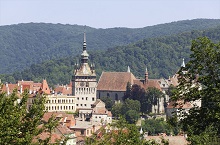Europe's Remnant of the Middle Ages - My Findings on Romania and the Romanian Language
December 26, 2016

Hello, I am Yosshi. I entered the translating business two years ago, dreaming of an international career. Since then, every day I keep discovering more about the ever-fascinating world of translation.
As a sports fan, the thing that came to mind when I thought of Romania was "Women's Gymnastics". However, as I got to know the country more, I realized that Romania, like the other East European countries, has a long history of domination by foreign powers. Today, in Japan, it is called "Yōroppa saigo no chūsei (Europe's Remnant of the Middle Ages)," and attracts many tourists from all over the world. Besides tourism, Romania has also been growing economically after joining the EU in 2007. There are now increasing business transactions between Romania and the world, and new businesses are popping up within the country as well.
Here are my findings on this country.
Like other East European countries, Romania has a long history of invasion and domination by foreign countries. The area which is now Romania was called Dacia during the time when the general Julius Caesar, famous for the quote "the die is cast", was pursuing his foreign conquests. Today's Romanians are said to be the descendents of a mix between Romans and Romanians born during that era. The country's name "Romania" is said to mean "Land of Rome."
Facts about Romania
The Romanian Language
According to a website introducing the characteristics of Romanian, it is one of the Romance languages which form a branch of the Italic languages in the Indo-European language family. Having originated from Latin, Romanian is a unique language with many Latin-sounding words, unlike the various South Slavic languages. However, from a grammatical standpoint, it is particular within the Latin languages, and actually has more in common with Bulgarian. From these facts, we can have a vague idea of how unique a language Romanian is.
More specifically, the unique characteristics of Romanian within the Latin languages include: the definite article coming after the noun, and the vocative case and neuter gender still in use. Good news for Japanese people is that the pronunciation is similar to Japanese, and that Romanian words have a straight-forward reading with only a few exceptions, because of its phonogramic alphabet.
Business and Communication in Romania
Many Europeans are multilingual, and can speak foreign languages besides their mother tongue. However, according to the Romania guide of HotelTravel.com, Romanians tend to prefer communicating in their mother tongue. It seems that young generations and people working in the tourism industry speak English on many occasions, but even so, Romanian remains their essential means of communication. Furthermore, in terms of gestures, people in Romania oftentimes shake hands, kiss the other's hand, or have a brief hug when they meet people for the first time. For unaccustomed Japanese people, it would be fine to just shake hands while keeping eye contact.
According to the same website, when calling people's names in Romanian, it is polite to put "Nomnul" before a man's name and "Doamma" before a woman's. It is similar to "Mr." and "Ms." in English. In Japan too, Japanese people would be pleased to be called "... san" by foreigners. I would like to try using "Nomnul" and "Doamma" when I meet people from Romania.
Additionally, according to the book Nihonjin ga shiranai yōroppa 46 kakoku no kokuminsei (National Characteristics of the 46 European Countries that Japanese People Don't Know About) (PHP Bunko), there are many in Romania who do not like the world associating their country with Dracula. So if I ever have the chance to talk with a Romanian, I will remember to talk of Romanian wine rather than Dracula then.
Romania: a Bright Future in Tourism and Business
Being someone who loves to travel, the phrase "Europe's Remnant of the Middle Ages" captivates me. My research informed me of Romania's complicated history and its perplexing language, seemingly impossible to master. But I realize that these elements make up part of the country's charm. From now on, I think I will be able to follow events in Romania with more interest.
Romania's Past
According to the Tourism Assistance Center for Developing Countries (DTAC), Romania is situated in the north of the Balkan Peninsula, and its land area is roughly the same as the main island of Japan.
Related Services
| << Movements in Greece: the Focus of the World | Japan-Turkey Friendship Celebrated in Movie "125 Years Memory" - Turkey and the Turkish Language >> |
To Contact Us Regarding Our Translation Services
For urgent needs, call:
+81-3-5730-6133
